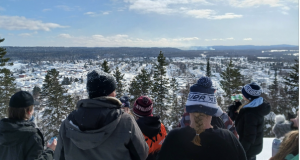Today, Premier Doug Ford and Greg Rickford, Minister of Indigenous Affairs, released the following statement in recognition of Orange Shirt Day and the inaugural National Day for Truth and Reconciliation:
“Today, people in Ontario and across Canada will wear orange shirts to remember and honour the many Indigenous children who were taken from their communities and families and forced to attend residential schools.
We observe Orange Shirt Day thanks to the courage of Phyllis Jack Webstad, from the Stswecem’c Xgat’tem First Nation, who bravely shared her experiences attending St. Joseph Mission Residential School in British Columbia in 1973. On her first day of school, Phyllis proudly wore an orange shirt given to her by her grandmother. Upon her arrival there, the shirt was immediately taken away from her, marking the beginning of Phyllis’s long separation from her family and community, and from her culture and language.
Tragically, Phyllis’s story is but one of tens of thousands of residential school survivor stories. Today, as we honour them, we must not forget the countless Indigenous children who did not return home. The recent discoveries of remains found at former residential school sites in western Canada has underscored the need for all Ontarians to learn about and recognize these painful truths and the ongoing harms resulting from the residential school system.
This year, September 30th also marks the first observance of a National Day for Truth and Reconciliation. It is vital that we commemorate the loss of generations who are no longer with us, and to acknowledge the ongoing trauma experienced by residential school survivors, their families and their communities.
To mark the first National Day for Truth and Reconciliation and Orange Shirt Day, Ontario will join other governments across Canada to light several buildings in cities across the province, as well as Niagara Falls, orange. This is being done at the request of the National Centre for Truth and Reconciliation to honour the children who did not come home and those who have lived as survivors and their families.
Indigenous peoples have endured the harsh realities and have felt the impact of residential schools for generations. It is long past time for all Ontarians to acknowledge this dark stain on our history and to take action. We encourage everyone to attend a local event today, whether in-person or virtual to learn more about the impact of residential schools. This is an opportunity to reflect and strengthen our relationships with Indigenous peoples and to play an active role in supporting healing and reconciliation.
This long and difficult journey cannot be completed in one day; we must pledge to undertake it — together — each and every day.”
Additional Resources
- Indian Residential Schools Resolution Health Support Program
- Talk4Healing – a culturally grounded helpline for Indigenous women
- Hope for Wellness Help Line for Indigenous Peoples
- Read Phyllis Webstad’s Story in Her Own Words
- Watch the Story of Chanie Wenjack
- Remember Me – An Annual Day of Remembrance
- Read the Truth and Reconciliation Commission Reports
- Did You Live Near a Residential School?
- A Timeline of Residential Schools in Canada
- Ontario Fast-Tracks Kinross Gold’s Great Bear Project Under ‘One Project, One Process’ - February 17, 2026
- Ontario and Marten Falls First Nation Sign Historic Agreement to Unlock Ring of Fire - November 28, 2025
- Ontario Investing in Winter Roads Network - November 25, 2025
 Wawa-news.com Local and Regional News
Wawa-news.com Local and Regional News
